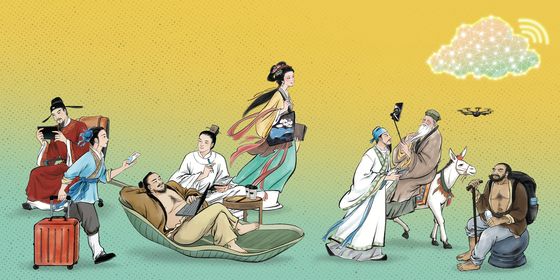Discover these ancient Chinese “chengyu” about bad bosses, inept leaders, and lazy managers
Bad bosses can be costly. When Qu Jing, Baidu’s vice president and PR chief, shared her authoritarian management techniques on social media, the ensuing backlash knocked 6 billion Hong Kong dollars off the tech giant’s stock value overnight.
In several videos posted online, Qu admitted to forcing staff to become internet celebrities and declared that managers shouldn’t care about their employees’ lives outside the office. “Why should I care about her family? I’m not her mother-in-law?” Qu ranted about her female staff. She later resigned amid public outcry.
Ancient bosses could be worse. In the Ming dynasty (1368 – 1644), Emperor Wanli went 28 years without showing up for work at court, while Emperor Jiajing insisted that his ministers write him qingci (青词), an archaic literary form belonging to the Tang dynasty (618 – 907) priests. He would promote officials based on their writing flair.
From mandatory overtime to psychological oppression, toxic workplace culture is nothing new. Workers since ancient times have dealt with arrogant, dishonest, and lazy managers. Their frustrations live on in several Chinese chengyu still used today to describe inept leaders. Here are some idioms you can use to complain about your manager:
The pot thunders 瓦釜雷鸣
The ancient poet Qu Yuan (屈原), still celebrated each year during China’s Duanwu (or Dragon Boat) Festival, railed against incompetent leaders chosen over more qualified ones. In one of his poems, written over 2,000 years ago, he described this scenario with a metaphor: “The golden bell is discarded while the earthenware pot thunders (金钟毁弃,瓦釜雷鸣 jīnzhōng huǐqì, wǎfǔ léimíng).” The second phrase, 瓦釜雷鸣, became a common idiom to describe a terrible boss. A less direct but more accurate translation is something like: “An empty vessel makes the most noise.”
Discover more Chinese proverbs:
- Idiomized: How to Talk Fake News in 4 Characters
- Chengyus About Qu Yuan
- How Sexist were Ancient Chinese Idioms?
Order others around 颐指气使
The idiom 颐指气使 (yízhǐ qìshǐ) describes an insufferably arrogant and self-important leader. 颐指 literally means “to indicate with the chin” while 气使 refers to ordering others with facial expressions only. Thus the chengyu’s literal meaning is “to give orders with gestures.” It is often used to describe those who haughtily command their subordinates.
The fox borrows power from the tiger 狐假虎威
Arrogance is not always a sign of power. Many leaders may act tough but have little authority or are bluffing to get what they want. Such bosses can be referred to as 狐假虎威 (hújiǎ hǔwēi, a fox borrowing power from a tiger).
This chengyu comes from a parable recounted in Strategies of the Warring States (《战国策》), a historical text written in the Western Han dynasty (206 BCE – 25 CE). When a tiger caught a fox in the forest, the fox tried to convince the tiger not to eat him by claiming the gods appointed him king of all animals in the forest. To prove this, the fox asked the tiger to accompany him through the forest. All the other animals ran away as they walked, just as the fox had predicted. The tiger was convinced, and let the fox go. The reality, of course, was that the animals were afraid of the fierce tiger, not the wily fox.
狐假虎威 is now used to describe someone who intimidates or bullies others by relying on the might of a more powerful entity.
One can even combine this idiom with 颐指气使 in a single sentence:
Don’t be fooled by his bossy demeanor; he’s just a fox relying on a tiger’s might.
别看他颐指气使的,其实不过是狐假虎威罢了。
Morning orders revised by evening 朝令夕改
Leaders need to make decisions, but they don’t always get things right. Hasty and irresolute bosses might be accused of “issuing orders in the morning and revising them by the evening (朝令夕改 (zhāolìng xīgǎi).” This phrase was first used by Chao Cuo (晁错), a Han dynasty (206 BCE – 220 CE) official, in an imperial memorial complaining about frequent policy changes.
Another idiom to describe indecisive and overly cautious authorities is 优柔寡断 (yōuróu guǎduàn, irresolute and hesitant).
Act like a corpse seeking a free lunch 尸位素餐
Some bosses are irresponsible and lazy, relying on others to do all the work. The idiom 尸位素餐 (shīwèi sùcān) refers to a boss who is as work-shy as a corpse and is just in the position to enrich themselves. The Han dynasty official Zhu Yun (朱云) is credited with inventing this phrase to criticize colleagues who enjoyed all the benefits of their positions without doing any work.












